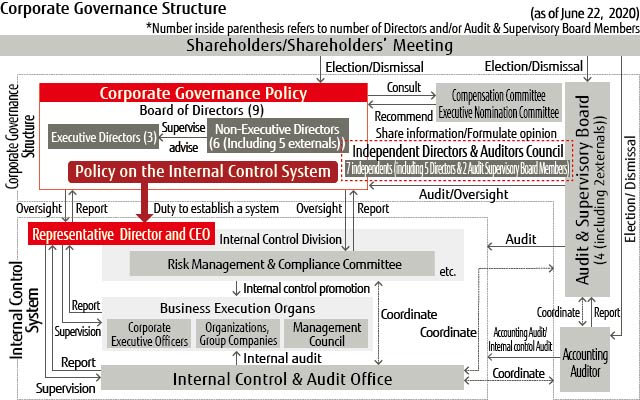Corporate Governance
Basic Approach to Corporate Governance
Through a decision by the Board of Directors in December 2015, Fujitsu formulated a basic policy that sets out its approach to corporate governance (the "Corporate Governance Policy"). This Policy has been deliberated and established to best fit the present company conditions. However, considering the objective of corporate governance—that is, to conduct a better management—the company is working to continuously review the Policy so that it does not become too rigid or lose substance, as well as holding periodic discussions on the Policy in the Board of Directors Meeting to maintain the best corporate governance structure.
The company recognizes that corporate governance is an indispensable mechanism to manage the company under our Purpose (from the Fujitsu Way). This is not merely to pursue short-term profits, but to ensure the trust of customers and business partners, to encourage employees to engage in activities vibrantly and proudly, and to contribute to society. For these reasons, the company designed a governance structure based on the following approach.
- Basic Approach
 https://www.fujitsu.com/global/documents/about/csr/governance/approach-e/pdf/approach_e.pdf
https://www.fujitsu.com/global/documents/about/csr/governance/approach-e/pdf/approach_e.pdf
The latest version, revised in June 2020, can be downloaded from the URL below.
- Corporate Governance Policy
 https://www.fujitsu.com/global/documents/about/ir/library/governance/governancereport-b-en.pdf
https://www.fujitsu.com/global/documents/about/ir/library/governance/governancereport-b-en.pdf
Corporate Governance Structure (as of June 22, 2020)
In accordance with its Corporate Governance Policy, the company outlines the following rules to ensure effective oversight and advice, given from the diverse perspectives of Non-Executive Directors (hereinafter, the term used for a combination of Independent Directors and Non-Executive Directors appointed from within the company), to Executive Directors on their business execution as part of the Board of Directors function while taking advantage of the company through the Audit & Supervisory Board system.
<Board of Directors>
The Company has a Board of Directors to serve as a body for making important decisions and overseeing management. The Board of Directors mainly acts in an oversight and advisory role and delegates the decision-making authority over business execution to the Representative Directors and subordinate Corporate Executive Officers to the broadest extent that is permitted by law and the Articles of Incorporation of the company and is considered to be reasonable. Moreover, the oversight function of the Board of Directors has been strengthened by actively appointing External Directors with a high degree of independence and diverse perspectives. Furthermore, in order to better define the management responsibility of the Directors, their terms were reduced from two years to one year in accordance with a resolution at the June 23, 2006 Annual Shareholders’ Meeting.
As of June 22, 2020, the Board of Directors consists of nine members in total, comprising three Executive Directors and six Non-Executive Directors (including five External Directors).
The Company held 13 meetings of the Board of Directors in FY2019 (including one extraordinary Board of Directors meeting) to discuss the formulation of the Management Direction and measures for its implementation as well as to decide a new management system based on reports from the Executive Nomination Committee.
<Audit & Supervisory Board>
The Company has an Audit & Supervisory Board that performs the auditing and oversight functions. The auditing and oversight functions are carried out by Audit & Supervisory Board Members, who review the Board of Directors as well as business execution functions and attend important meetings, including meetings of the Board of Directors. As of June 22, 2020, the Audit & Supervisory Board has four members, comprising two full-time Audit & Supervisory Board Members and two External Audit & Supervisory Board Members. The Audit & Supervisory Board held nine meetings in FY2019, focusing primarily on reviewing the audit policy and audit plan, the audit methods used by the accounting auditor, and the appropriateness of the results. They also listened to reports from the internal auditing departments and reported key matters from the full-time Audit & Supervisory Board members to the External Audit & Supervisory Board members.
<Independent Directors & Auditors Council>
As an initiative aimed at enhancing "positive governance" that will help to boost its medium- and long-term profitability, the Company has established an Independent Directors & Auditors Council, made up entirely of independent officers (five Independent Directors and two Independent Auditors).
To stimulate discussions by the Board of Directors on the Company's medium- and long-term orientation, it is considered essential that there be an ongoing mechanism by which independent officers, who are necessarily distanced from the actual workings of the business, are able to more closely understand the Company's business. This Council is designed to enable the independent officers to exchange information and share views in the process of forming their opinions.
In FY2019, the Independent Directors and Auditors Council met eight times to exchange views based on the sharing of information and opinions with independent directors, addressing issues that included management policy, human resource development and the scope of business of the Company and the Fujitsu Group.
<Executive Nomination Committee & Compensation Committee>
The Company has established the Executive Nomination Committee and the Compensation Committee as advisory bodies for its Board of Directors to ensure the transparency and objectivity of its process for nominating Directors and Audit & Supervisory Board Members and its process for determining executive compensation as well as to ensure the fairness of the method and the level of executive compensation.
The Executive Nomination Committee deliberates on candidates for Director and Audit & Supervisory Board Member positions in accordance with the Framework of Corporate Governance Structure and the Procedures and Policy for nomination/dismissal of Directors and Auditors stipulated in the Company’s Corporate Governance Policy and provides its recommendations to the Board of Directors. In addition, the Compensation Committee provides its recommendations about the level of base compensation and the method for calculating performance-based compensation to the Board of Directors in accordance with the Procedures and Policy for Determining Directors and Auditors Compensation stipulated in the Company’s Corporate Governance Policy. Conditional upon the approval of the Compensation Committee, the CEO determines the performance targets and the individual amounts for the base compensation and performance-based stock compensation for each Director.
The members of each committee appointed in July 2020 are as follows, and consist of three Independent Directors. Additionally, the secretariats of both committees are operated by the Company’s HR and legal departments.
- Executive Nomination Committee
Chairperson: Jun Yokota (Independent Director)
Members: Chiaki Mukai, Yoshiko Kojo (Independent Directors) - Compensation Committee
Chairperson: Chiaki Mukai (Independent Director)
Members: Jun Yokota, Yoshiko Kojo (Independent Directors)
In July 2019, following the appointment of members to the two committees, the Executive Nomination Committee met twice to discuss the election of Representative Directors (including the CEO) and the nomination of candidates for Director, etc. The Compensation Committee met three times to discuss compensation for Directors and Auditors, bonuses, etc. Both committees provided recommendations to the Board of Directors.
- Corporate Governance Report
Matters on Functions such as Business Execution, Auditing, Oversight, Nomination and Compensation Decisions (Overview of Current Corporate Governance System) https://www.fujitsu.com/global/documents/about/ir/library/governance/governancereport-en.pdf
https://www.fujitsu.com/global/documents/about/ir/library/governance/governancereport-en.pdf
The chart below provides an overview of the Company's corporate governance structure. (As of June 22, 2020)

Reasons for Adoption of Current Corporate Governance System
We believe that both direct oversight of business execution by Non-Executive Directors and oversight by Audit & Supervisory Board Members who remain distant from the decision making and operation of business execution should work jointly to ensure highly effective oversight performance. The company has adopted the "company with Audit & Supervisory Board” model where an Audit & Supervisory Board, composed of the Audit & Supervisory Board Members, is established and appointed as an independent agent.
The Board of Directors is composed of at least as many Non-Executive Directors as Executive Directors to ensure its capacity to correct faulty, insufficient, or excessive business executions. While External Directors should be the core of Non-Executive Directors on account of their high degree of independence, at least one Non-Executive Director is appointed from within the company to complement the External Directors’ knowledge in business fields and the corporate culture of the company so that the efficiency of oversight performance by the Non-Executive Directors is enhanced.
Policy for Determining Executive Compensation
Compensation paid to Directors and members of the Audit & Supervisory Board is determined based on the Executive Compensation Policy established by the Board of Directors, subject to approval by the Compensation Committee.
- Executive Compensation Policy (A-18)
 https://www.fujitsu.com/global/documents/about/ir/library/reports/Report120.pdf
https://www.fujitsu.com/global/documents/about/ir/library/reports/Report120.pdf
Basic Approach to the Internal Control System
To continuously increase the corporate value of the Fujitsu Group, it is necessary to pursue management efficiency and control risks arising from business activities. Recognizing this, the Board of Directors have formulated the "Policy on the Internal Control System", which provides guidelines on: a) how to practice and promote the Fujitsu Way, the principles that underlie the Fujitsu Group’s conduct; and b) what systems and rules are used to pursue management efficiency and control the risks arising from the Company’s business activities.
See below for the full text of the Policy on the Internal Control System and an overview of the operating status of the systems tasked with ensuring appropriate business practices.
- Internet releases of selected business reports and financial documents
 https://www.fujitsu.com/global/Images/notice120b.pdf
https://www.fujitsu.com/global/Images/notice120b.pdf
Disclosures Relating to Corporate Governance
Board of Directors (as of June 22, 2020)
| Name | Position and Responsibilities | Representation Authority | Independent Officer | |
|---|---|---|---|---|
| Business executed | Takahito Tokita | CEO, CDXO, Chairman of the Risk Management & Compliance Committee | ○ | |
| Hidenori Furuta | COO, CTO | ○ | ||
| Takeshi Isobe | Corporate Executive Officer, SEVP, CFO | |||
| Non-executive | Masami Yamamoto | Senior Advisor | ||
| Jun Yokota | ○ | |||
| Chiaki Mukai | ○ | |||
| Atsushi Abe | Chairman of the Board of Directors | ○ | ||
| Yoshiko Kojo | ○ | |||
| Scott Callon | ○ |
FY2019 Attendance at Meetings of the Board of Directors or Audit & Supervisory Board
| Meeting | Times Present | Attendance Rate |
|---|---|---|
| Board of Directors | 13 | 100% |
| Audit & Supervisory Board | 9 | 97.8%* |
* Of the five members of the Audit & Supervisory Board in FY2019, four attended every meeting, with only Koji Hatsukawa missing one of the nine meetings.



